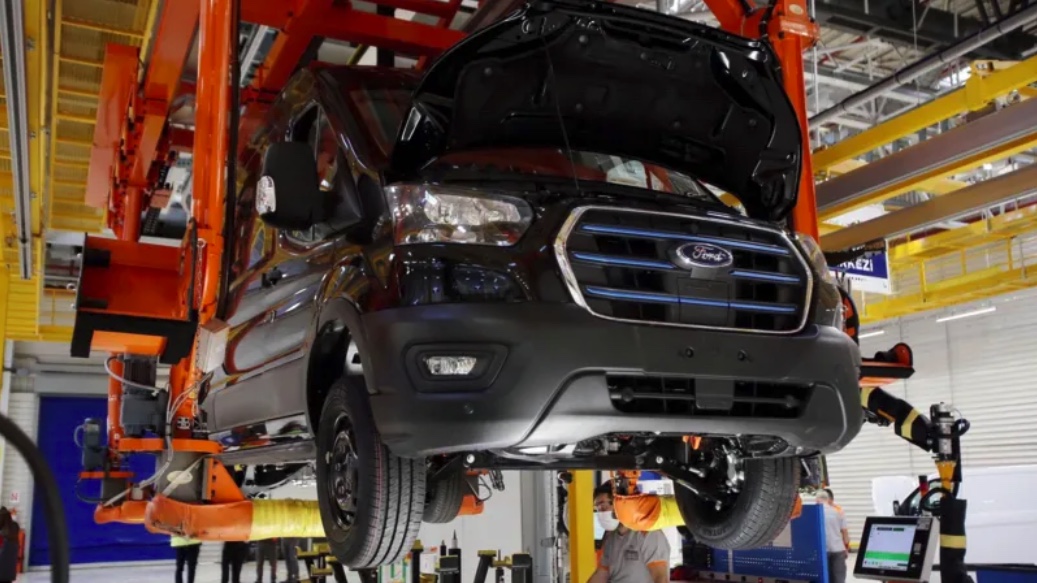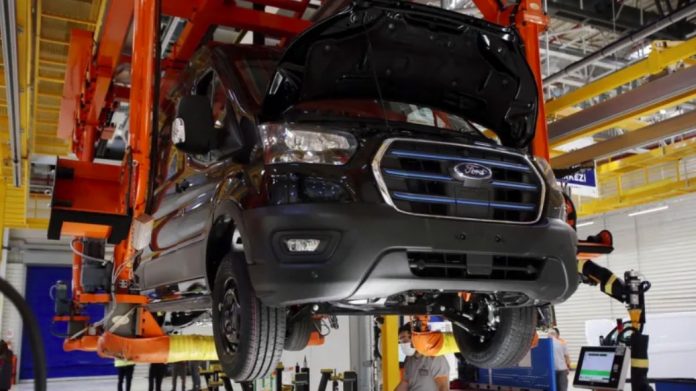Ford ได้ประกาศแผนลดตำแหน่งงานจำนวน 800 อัตราในสหราชอาณาจักรในช่วงสามปีข้างหน้า โดยเป็นส่วนหนึ่งของการปรับโครงสร้างครั้งใหญ่ ซึ่งรวมถึงการปิดรับตำแหน่งงานจำนวน 4,000 อัตราทั่วทั้งยุโรป
บริษัทให้เหตุผลว่าจำเป็นต้องดำเนินการดังกล่าวเนื่องจากสภาวะการค้าอันยากลำบาก เช่น การแข่งขันที่รุนแรงและความต้องการรถยนต์ไฟฟ้าที่ซบเซา อย่างไรก็ตาม การปรับลดครั้งนี้จะไม่กระทบต่อโรงงานผลิตใน Dagenham และ Halewood รวมถึงศูนย์โลจิสติกส์ใน Southampton โดย Ford มีแผนที่จะดำเนินการลดตำแหน่งงานโดยสมัครใจออกจากงานเป็นส่วนใหญ่
Lisa Brankin กรรมการผู้จัดการของ Ford สหราชอาณาจักรและไอร์แลนด์ กล่าวว่า “การประกาศในครั้งนี้ไม่ใช่สิ่งที่ใครอยากได้ยิน และดิฉันเข้าใจดีว่าสิ่งนี้จะส่งผลกระทบอย่างมากต่อพนักงานของเรา เราจะพยายามทำให้การลดตำแหน่งงานครั้งนี้เกิดขึ้นผ่านโครงการสมัครใจให้ออกจากงานให้ได้มากที่สุด”
ปัจจุบัน Ford มีพนักงานประมาณ 5,300 คนในสหราชอาณาจักร และการปรับโครงสร้างครั้งนี้จะส่งผลกระทบต่อพนักงานในตำแหน่งงานบริหารและพัฒนาผลิตภัณฑ์เป็นส่วนใหญ่
โรงงานผลิตเครื่องยนต์ดีเซลสำหรับรถตู้ที่โรงงาน Dagenham ใน Essex และโรงงานผลิตชุดเกียร์ใน Halewood รวมถึงศูนย์โลจิสติกส์ใน Southampton จะไม่ได้รับผลกระทบจากการลดตำแหน่งงานนี้ โดยเฉพาะ Halewood กำลังอยู่ในขั้นตอนสุดท้ายของการสร้างโรงงานแห่งใหม่สำหรับผลิตมอเตอร์สำหรับรถยนต์ไฟฟ้า
อย่างไรก็ตาม ศูนย์วิจัยและพัฒนาใน Dunton ซึ่งเป็นสำนักงานใหญ่ในสหราชอาณาจักร รวมถึงศูนย์กระจายอะไหล่ขนาดใหญ่ใน Daventry อาจได้รับผลกระทบจากการปรับโครงสร้างนี้
นี่เป็นครั้งที่สองในรอบสองปีที่ Ford ปรับลดพนักงานในสหราชอาณาจักร โดยในเดือนมีนาคม 2023 บริษัทได้ประกาศลดพนักงานจำนวน 1,300 ตำแหน่ง ซึ่งคิดเป็นหนึ่งในห้าของพนักงานในประเทศ

การประกาศครั้งล่าสุดเกิดขึ้นในช่วงเวลาที่อุตสาหกรรมยานยนต์ในยุโรปกำลังเผชิญกับความยากลำบาก หลายบริษัทประสบกับต้นทุนพลังงานที่สูง ความต้องการรถยนต์ไฟฟ้าที่ต่ำกว่าคาด และการแข่งขันจากผู้ผลิตในจีน ผู้ผลิตรถยนต์รายใหญ่หลายรายในยุโรป เช่น Volkswagen, Mercedes Benz และ BMW ต่างก็เห็นผลกำไรลดลงในปีนี้ โดย Volkswagen ถึงกับพิจารณาปิดโรงงานในเยอรมนี ซึ่งเป็นก้าวที่ไม่เคยเกิดขึ้นมาก่อน
Lisa Brankin อธิบายว่า “อุตสาหกรรมยานยนต์กำลังเผชิญกับช่วงเวลาแห่งความเปลี่ยนแปลงครั้งใหญ่ ทั้งจากการแข่งขันที่ไม่เคยเกิดขึ้นมาก่อน กฎระเบียบที่เข้มงวด และอุปสรรคทางเศรษฐกิจจำนวนมาก”
แรงกดดันเหล่านี้เกิดขึ้นในขณะที่ Ford กำลังเปลี่ยนผ่านจากภาพลักษณ์เดิมในฐานะผู้ผลิตรถยนต์ราคาถูก สู่แบรนด์ระดับพรีเมียมที่มุ่งเน้นการผลิตรถยนต์ไฟฟ้า โดยเมื่อปีที่แล้ว Ford ได้ยุติการผลิตรถยนต์ Fiesta ซึ่งเป็นรถยนต์ที่มียอดขายมาเกือบห้าทศวรรษ
นอกจากการลดตำแหน่งงานในสหราชอาณาจักรแล้ว Ford ยังประกาศลดพนักงานจำนวน 2,900 คนในเยอรมนี และอีก 300 คนในประเทศอื่นๆ ทั่วยุโรป
ในขณะเดียวกัน รัฐบาลสหราชอาณาจักรกำลังเผชิญกับแรงกดดันจากอุตสาหกรรมยานยนต์ เกี่ยวกับกฎระเบียบที่กำหนดให้ผู้ผลิตต้องเพิ่มยอดขายรถยนต์ไฟฟ้า โดยในที่ประชุมระหว่างภาคอุตสาหกรรมและรัฐมนตรีในวันพุธนี้ คาดว่าจะมีการหารือประเด็นดังกล่าว
กฎ Zero Emission Vehicle (ZEV) Mandate ที่เริ่มบังคับใช้ในปีนี้ กำหนดให้ 22% ของรถยนต์ที่จำหน่ายต้องปลอดการปล่อยมลพิษ และหากผู้ผลิตไม่สามารถทำตามเป้าหมายได้ อาจถูกปรับถึง 15,000 ปอนด์ต่อคัน แม้ว่าจะมีกลไกยืดหยุ่นในข้อกำหนดที่ช่วยให้ผู้ผลิตหลีกเลี่ยงการถูกปรับในระยะสั้นได้ แต่โควตานี้จะเพิ่มขึ้นเป็น 28% ในปีหน้า และ 33% ในปี 2026 โดยมีเป้าหมายสูงถึง 80% ภายในปี 2030
ผู้ผลิตรถยนต์จำนวนมากให้ความเห็นว่าการเพิ่มโควตานี้เป็นไปอย่างรวดเร็วเกินไป แม้ว่ายอดขายรถยนต์ไฟฟ้าใหม่จะเพิ่มขึ้น โดยในเดือนตุลาคม รถยนต์หนึ่งในห้าคันที่จำหน่ายเป็นรถยนต์ไฟฟ้า แต่พวกเขาชี้ว่าความต้องการที่แท้จริงยังไม่สูงเพียงพอ ทำให้ต้องเสนอส่วนลดที่ไม่ยั่งยืนเพื่อบรรลุเป้าหมาย
บางบริษัทเรียกร้องให้รัฐบาลปรับเป้าหมายให้ลดลงเพื่อให้มีเวลาในการปรับตัว ขณะที่บางรายเสนอให้รัฐบาลเพิ่มแรงจูงใจจากภาษีและสร้างความมั่นใจให้ผู้บริโภคว่าจะมีสถานีชาร์จไฟฟ้าเพียงพอ
อย่างไรก็ตาม Vicky Read ผู้บริหารของ Charge UK เห็นว่าการลดเป้าหมายนี้จะเป็นการก้าวถอยหลัง และระบุว่า “รัฐบาลควรยึดมั่นในเป้าหมายนี้ และแสดงการสนับสนุนกฎระเบียบที่เห็นได้ชัดว่ากำลังส่งผลในทางที่ดี”
โฆษกรัฐบาลสหราชอาณาจักรกล่าวว่า “เรามุ่งมั่นที่จะทำงานร่วมกับอุตสาหกรรมอย่างใกล้ชิด เพื่อดำเนินการตามเป้าหมายการเปลี่ยนผ่านในปี 2030”
Ford cuts 800 jobs claiming weak demand for electric cars

Ford has announced it will cut 800 jobs in the UK over the next three years.
The move is part of a major restructuring programme, which will see 4,000 posts closed across Europe as a whole.
The company said it had to act because of difficult trading conditions, including intense competition and weak demand for electric vehicles.
However, the cuts will not affect its manufacturing sites in Dagenham and Halewood, or its logistics base in Southampton. Ford said it hoped to make the majority of job cuts through voluntary redundancy.
“Making this announcement isn’t something that anybody wants to do, and I appreciate it will have a very significant impact on our employees,” said Lisa Brankin, managing director of Ford of Britain and Ireland.
“It’s not the news anyone wants to hear at any time. So our aim is to try to deliver this through voluntary redundancy.”
Ford has 5,300 employees in the UK.
A government spokesperson told the BBC it has “asked the company to urgently share its full plans so we can help mitigate the impact in the UK”.
The restructuring plan will remove 15% of its workforce. The majority of them are expected to be administrative or product development roles.
The company currently makes diesel engines for vans at its Dagenham factory in Essex.
It builds gearboxes in Halewood and is in the final stages of creating a major new facility for producing motors for electric vehicles on the site.
Both factories are being protected from the cuts, along with Ford’s transport operations division, which is based in Southampton.
However, six other sites across the UK could be affected, including a major research and development centre at Dunton in Essex, where it also has its UK headquarters, and a giant parts distribution centre in Daventry.
This is the second round of cuts to hit Ford’s operations in Britain in less than two years. In March 2023 it said 1,300 jobs were to go, a fifth of its workforce, most of them at the Dunton site.

The latest announcement comes at a time when car manufacturers across Europe are struggling.
Among the issues they face are high energy costs, weaker than expected demand for electric cars and growing competition from Chinese manufacturers.
Many of the continent’s biggest names, including Volkswagen, Mercedes Benz and BMW have seen their profits tumble this year.
Volkswagen is even contemplating the closure of factories in Germany, a step that would be unprecedented.
“The automotive industry is going through a period of massive disruption at the moment,” explained Ms Brankin.
“We’ve got unprecedented competition, regulation and lots of economic headwinds”
Those pressures are hitting Ford at a difficult time. The carmaker is attempting to move away from its past as a mass-manufacturer of cheap “runabouts”, and position itself as more upmarket brand, focused on electric cars. Last year, it stopped making the Fiesta after nearly five decades.
In addition to the cuts in the UK, Ford will be shedding 2,900 jobs in Germany and another 300 in the rest of Europe.
Meanwhile in Britain, the government is coming under intense pressure from the car industry over rules designed to force them to build more electric vehicles. The issue is due to be discussed at a meeting between industry and ministers on Wednesday afternoon.
Under the so-called Zero Emission Vehicle (ZEV) Mandate, which came into force this year, at least 22% of cars sold must be classed as zero emission. If manufacturers fail to hit their quotas, they could face fines of up to £15,000 per car.
A number of carmakers are already struggling to meet their targets, although there are flexible mechanisms built into the rules which should allow them to avoid fines for the moment.
But the quota is due to rise to 28% next year, and to 33% in 2026 – being ramped up each year after that to hit 80% by 2030.
Manufacturers insist this is happening too fast. Although sales of new EVs are rising – with one in five cars sold in October being battery powered, they say this is misleading.
They claim demand for electric cars simply isn’t high enough yet, forcing them to offer unsustainable discounts in an effort to meet their targets.
Some are calling for the government to water down the quotas, in order to give them more time.
Others say it needs to offer greater taxpayer-funded incentives for electric cars, and to do more to reassure car buyers that enough charging infrastructure will be built.
But according to Vicky Read, chief executive of charging firm Charge UK a weakening of the mandate would be the wrong move.
“The government must hold its nerve and use the meeting to signal support for a policy that is evidently working,” she said.
A government spokesperson said it is “determined to work in close partnership with industry as we implement the 2030 transition deadline”.
By Theo Leggett, BBC News

















